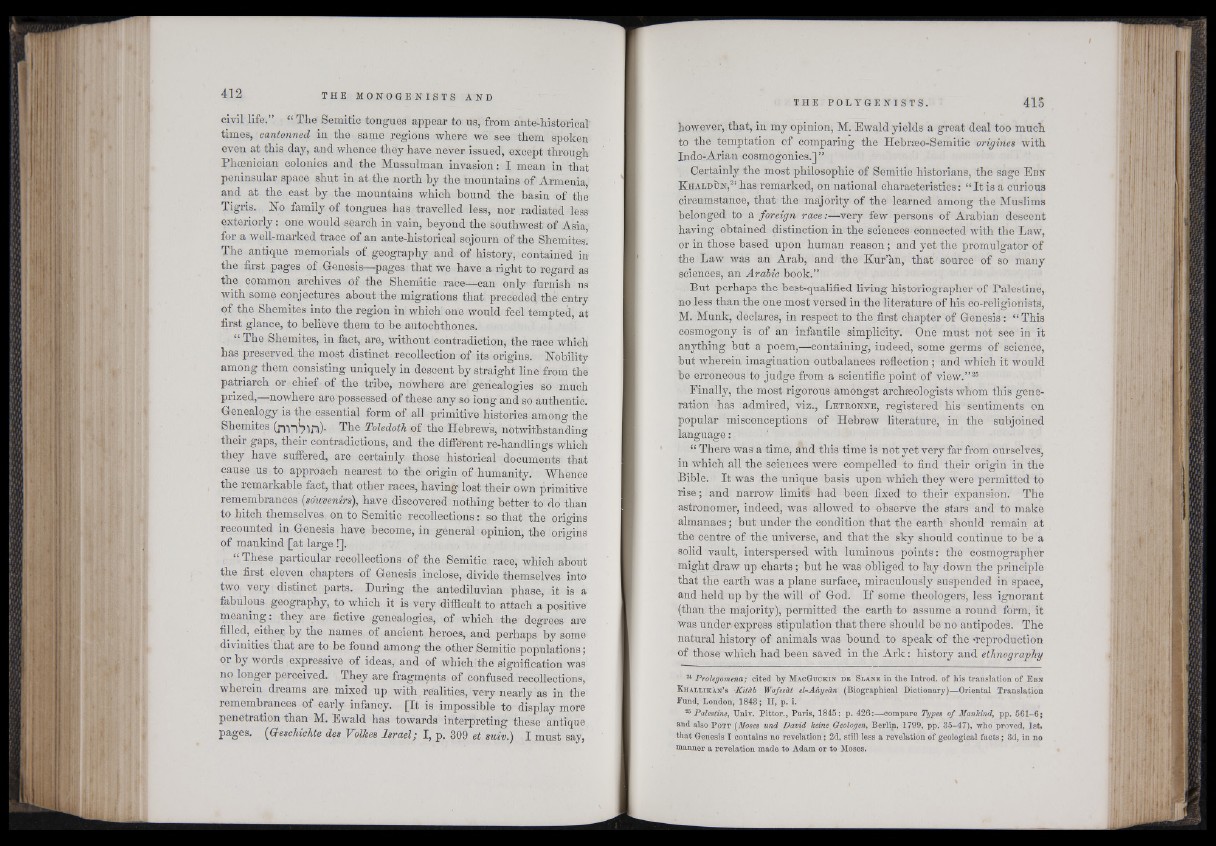
civil life.” “ The Semitic tongues appear to us, from ante-historical'
times, cantonned in the same .regions where we see them spoken
even at this day, and whence they have never issued, except through
Phoenician colonies and the Mussulman invasion: I mean in that
peninsular space shut in at the north by the mountains of Armenia,
and at the east by the mountains which hound the basin of the
Tigris. No family of tongues has travelled less, nor .radiated less
exteriorly: one would search in vain, beyond the southwest of Asia,
for a well-marked trace of an ante-historical sojourn of the Shemites.
The antique memorials of geography and of history, contained in
the first pages of Genesis—pages that we have a right to regard as
the common archives bf the Shemitic race—can only furnish us
with some conjectures about the migrations that preceded the entry
of the Shemites into the region in which one would feel tempted, at
first glance, to believe them to be autochthones.
The Shemites, in fact, are, without contradiction, the race which
has preserved the most distinct recollection of its origins. Nobility
among them consisting uniquely in descent by straight line from the
patriarch or chief of the tribe, nowhere are genealogies so much
prized,—nowhere are possessed of these any so long and so authentic.
Genealogy is the essential form of all primitive histories among the
Shemites (m iShl)- Tile Toledoth of the Hebrew's, notwithstanding
their gaps, their contradictions, and the different re-handlings which
they have suffered, are certainly those historical documents that
cause us to approach nearest to the origin of humanity. Whence
the remarkable fact, that other races, having lost their own primitive
remembrances (souvenirs), have discovered nothing better to do than
to hitch themselves on to Semitic recollections: so that the origins
recounted in Genesis have become, in general opinion, the origins
of mankind [at large !].
These particular recollections of the Semitic race, which about
the first eleven chapters of Genesis inclose, divide themselves into
two very distinct parts. During the antediluvian phase, it is a
fabulous geography, to which it is very difficult to attach a positive
meaning: they are fictive genealogies, of which the degrees are
filled, eit.lier by the names of ancient heroes, and perhaps by some
divinities that are to be found among the other Semitic populations;
or by words expressive of ideas, and of which the signification was
no longer perceived. They are fragments of confused recollections,
wherein dreams are mixed up with realities, very nearly as in the
remembrances of early infancy. [It is impossible to display more
penetration than M. Ewald has towards interpreting these antique
pages. (G esc hie hi c des Volkes Israel/ I, p. 309 et suiv.) I must say,
however, that, in my opinion, M. Ewald yields a great deal too much
to the temptation of comparing the Hebrseo-Semitic origines with
Indo-Arian cosmogonies.] ”
Certainly the most philosophic of Semitic historians, the sage Ebn
KHALDtrN,24 has remarked, on national characteristics: “ It is a curious
circumstance, that the majorily of the learned among the Muslims
belonged to a foreign race:—very few persons of Arabian descent
having obtained distinction in the sciences connected with the Law,
or in those based upon human reason; and yet the promulgator of
the Law was an Arab, and the Kur’an, that source of so many
sciences, an Arabic book.”
But perhaps the best-qualified living historiographer of Palestine,
no less than the one most versed in the literature of his co-religionists,
M. Munk, declares, in respect to the first chapter of Genesis: “ This
cosmogony is of an infantile simplicity. One must not see in it
anything but a poem,—containing, indeed, some germs of science,
but wherein imagination outbalances reflection; and which it would
be erroneous to judge from a scientific point of view.”25
Finally, the most rigorous amongst archaeologists whom this generation
has admired, viz., L e tro n n e , registered his sentiments on
popular misconceptions of Hebrew literature, in the subjoined
language:
“ There was a time, and this time is not yet very far from ourselves,
in which all the sciences were compelled to find their origin in the
Bible. It was the unique basis upon which they were permitted to
rise; and narrow limits had been fixed to their expansion. The
astronomer, indeed, was allowed to observe the stars and to make
almanacs; but under the condition that the earth should remain at
the centre of the universe, and that the sky should continue to be a
solid vault, interspersed with luminous points: the cosmographer
might draw up charts; but he was obliged to l'ay down the principle
that the earth was a plane surface, miraculously suspended in space,
and held up by the will of God. If some theologers, less ignorant
(than the majority), permitted the earth to assume a round form, it
was under express stipulation that there should be no antipodes. The
natural history of animals was bound to speak of the 'reproduction
of those which had been saved in the Ark: history and ethnography
u Prolegomena; cited by M a c G u c k in d e S l a n e in the Introd. of his translation of E b n
K h a l l i k X n ’s Kiidb Wafeecit el-A&ye&n (Biographical Dictionary)—Oriental Translation
Fund, London, 1843; II, p. i.
25Palestine, Univ. Pittor., Paris, 1845; p. 426:—compare Types of Mankind, pp. 561-6;
and also P o tt (Moses und David keine Geologen, Berlin, 1799, pp. 35-47), who proved, 1st,
that Genesis I contains no revelation; 2d, still less a revelation of geological facts; 3d, in no
manner a revelation made to Adam or to Moses.